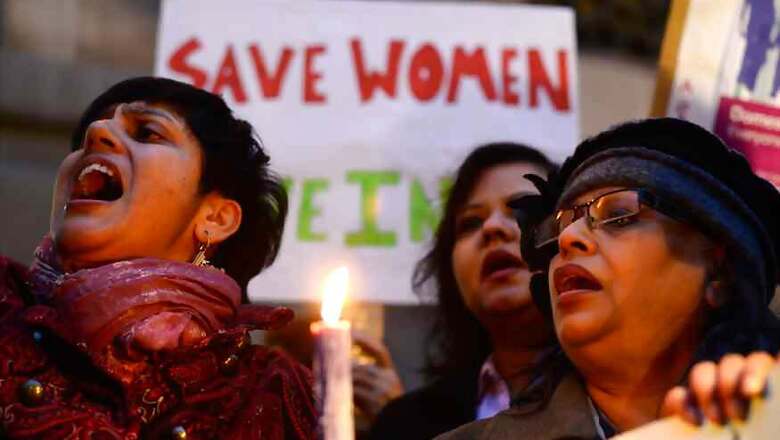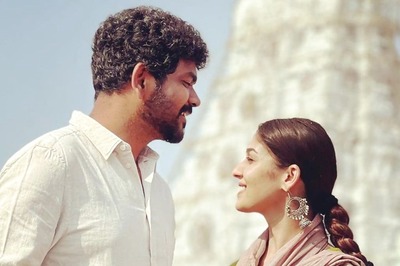
views
The details of the violence and torture inflicted on a little girl in Jammu have become common knowledge to the world today. While the gory details stirred a kneejerk emotional reaction from almost everyone, it did not just stop there.
With growing momentum on increasing the toughness of child sexual abuse laws, the Centre wrote to the Supreme Court on Thursday with regard to the amendment of the Protection of Children from Offences Act (POCSO) 1980 under the Criminal Law (Amendment) Ordinance, 2018.
According to sources, the Union Cabinet, led by PM Narendra Modi, has already approved the promulgation of the Ordinance, which will lead to changes such as reduction in the time limit of rape trials to two months and addition of more fast-track courts, among other things in addition to the provision of capital punishment.
“Death is the only thing that a criminal is afraid of. That is why no other laws work. In my experience of almost 40 years, I have observed that execution is the only thing that can prevent such crimes,” former Delhi High Court judge RC Chopra felt.
He was echoing the thoughts of hundreds of others, including Minister for Women and Child Development Maneka Gandhi, who has sought a similar remedy.
“If you look at the court order, it only asks for death penalty clause for severe cases. I feel all child rape cases should be given death penalty. These people are not just criminals, they are terrorists. They create terror through their activities. They need to be dealt with accordingly,” Supreme Court’s advocate on record Sneha Kalita told News18.
“There can be no reformation of rapists, so that theory does not apply here. Child rapists specially are socially demented. Arming POCSO with capital punishment is bound to act as a deterrent against them,” Kalita said.
But is it really an effective deterrent?
Many disagree.
“Nowhere ever has capital punishment been helpful in preventing rape. If it had, why would there still be so much crime? There was a reason the world moved away from capital punishment. It undermined right to life and has proven problematic everywhere that it was practised in the world,” former Supreme Court judge Ashok Kumar Ganguly told News18.
“I understand that the crime which has brought on this onslaught of public interest in revising rape laws is heinous and absolutely unthinkable. But such a law of capital punishment will require a very strict and complicated set of guidelines for implementation which is bound to get hard for prosecution to follow leading to inaccuracies in judgment,” he added.
He said that in the 2012 Delhi gang-rape, a case that people were now citing as reference in their demand for capital punishment, the accused were given capital punishment for murder and not rape.
“There is no proof that either rape or murder was deterred by that move,” the former judge said.
Professor (Dr.) Faizan Mustafa, Vice-Chencellor of the NALSAR University of Law in Hyderabad, was also against the amendment’s proposed benefits.
“I am opposed to death penalty. This is regressive decision,” the professor told News18.
A report titled ‘Deterrence and the Death Penalty’, released in 2012 by US-based National Research Council of the National Academies, analysed research done for over 30 years on death penalty acting as a deterrent to murder, only to conclude that death penalty had no impact on deterring or preventing murders.
‘Knee-jerk’ reaction?
Many feel that the move to amend POCSO is to win over public sentiment at a time when tempers are running high.
According to Asmita Basu, Programmes Director at Amnesty India, the move to add the provision of capital punishment may just be a bit hasty.
“It seems that the government just wants to act out the popular sentiment without actually attacking the cause of the problem. No study has ever pointed out that capital punishment can act as a deterrent to anything,” Basu told News18.
“Rape laws need serious reflection as they must keep in mind the best interest of the child. In this case, capital punishment may actually lead to hampering the best interest of the victim,” Basu said.
She was referring to the fact that in most cases of child sexual abuse, the perpetrators of the crime are often family members and/or close, trusted associates of the family.
“It is already hard for children to report cases of abuse or violence due to familial pressure, lack of agency, shame. We come across many cases in which families try to protect the perpetrators to save the family name and honour. Sometimes, these accusations are not even taken seriously when mentioned. Add to that the threat of a death penalty and more such incidents of under-reportage may occur,” Meenakshi Ganguly, South Asia Director of Human Rights Watch, said.
Previously, activists have also raised concerns that death penalty may lead to more post-rape murder among minor victims as leaving a survivor would pose a greater risk of being caught and sentenced to death.
What should preventive measures focus on instead?
Referring to the move to amend POCSO as a “short-term remedy”, Meenakshi Ganguly told News18, “It is easier for the government to just say ‘oh look, we amended rape laws, now we hang child rapists’. That can never be a systematic solution. We need to look at education, sensitisation and accountability of government to actually make any difference to rape numbers.”
She stressed on the fact that there was still no structured education or development communication about rape and rape laws in the country and that existing rape laws like POCSO suffered from poor implementation.
“Most of the special courts to be set up under POCSO are still underway, there is a lack of good police who understand rape and can conduct thorough investigations. Often victims are shamed and dismissed and in some cases, it takes time to even file FIRs. And when they do, conviction rates are low and sometimes the course of law is obstructed by political agents as we saw in cases of the Unnao and Kathua rapes. What good are laws when there is no implementation or when custodians of that law decide to break it?” Meenakshi asked.
She added that along with laws, maybe the government also needed to invest in picking better leaders and learning when not to defend the accused.
Deterrent or Retributive?
In the last four months, at least four states, including Madhya Pradesh, have moved towards or proposed a move to incorporate capital punishment for raping children below a certain age.
Madhya Pradesh has already passed the bill adding death provision. Rajasthan has tabled a bill with similar changes and the state governments of Haryana and Karnataka have shown interest in amending their laws too.
Internationally, countries that punish rape with death (or a combination of death and life imprisonment) include Saudi Arabia, Japan, Iran, Pakistan, Cuba, Bangladesh, and in some states of the United States such as Florida and Louisiana. There are many other countries that use capital punishment as the response to a series of other crimes too.
Whether capital punishment can act as a true deterrent to crime was also questioned by Dr Suprakash Chaudhury of the Department of Psychiatry, Pravara Institute of Medical Sciences in Maharashtra.
“One has to look at it this way. When we say ‘death to the rapist’, do we mean either a retributive action where the affected party is seeking retribution for a heinous crime or a deterrent action, which would act as a preventive factor against such crimes from occurring,” the psychiatrist, who co-authored the review article ‘Psychological Aspects of Rape and Its Consequences’.
Another way is the reformative approach that will lead to reforming a criminal but society often does not want to go that way as then this person is expected to be reformed on taxpayers’ money, Chaudhury added.
“Saying that punishing child rape with death penalty will lead to reduction in child rape is a fallacy. It may lead to some short-term reduction since the causes of rape are variable and subjective. But if the move is to signify retribution, to send a message, then death penalty for child rapists makes perfect sense,” Chaudhary told News18.
By the end of 2017, 109 countries have abolished death penalty as a form of punishment in law for all crimes and 142 countries have abolished it in law and practice.




















Comments
0 comment